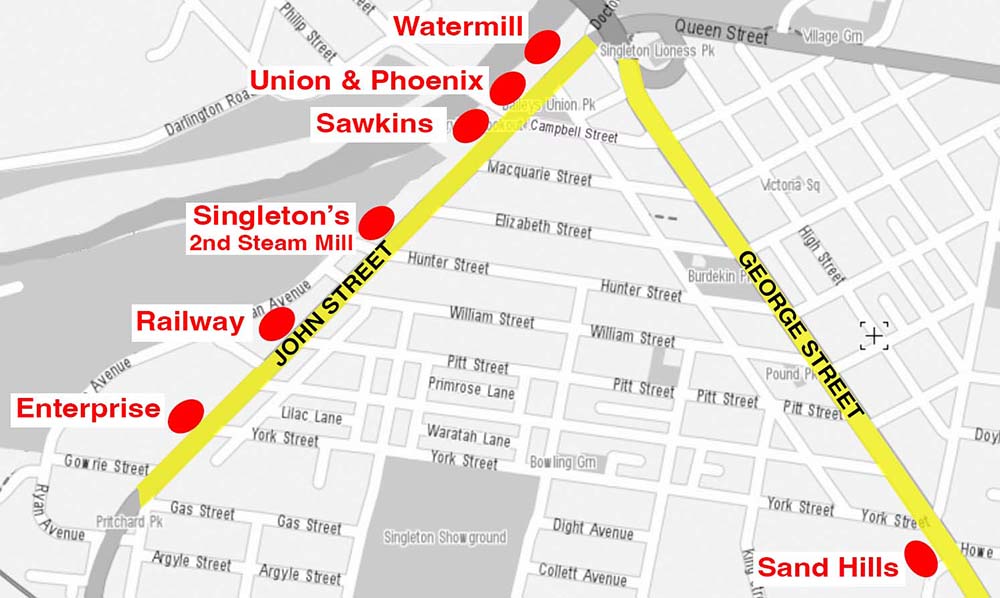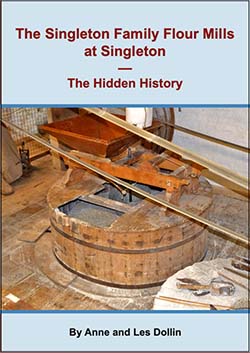
Flour Mills in Singleton in the 1800s
aka Union Mill, Phoenix Mill, Railway Mill, Sawkins Mill, Enterprise Mill, Singleton's Mill
Singleton Mills homepage > Overview of the Singleton Mills > Flour mills at Singleton township
• The township of Singleton, NSW, was the site of at least eight flour mills in the 1800s. • Four of these mills were established by the Singleton family. |
Singleton is located on a major road leading from rich agricultural regions in western NSW towards the coast. From the 1820s onwards, a steady stream of bullock-drawn wagons carried wheat grown in the interior towards Newcastle.
The bullock wagons crossed the Hunter River at a natural ford, originally called Singleton's Ford but later known as Dunolly Ford. Benjamin Singleton established the township of Singleton beside this ford.
The flour mills at Singleton were in an excellent location to provide milling services to the owners of the many loads of wheat that passed through the town.
Flour Mills in Singleton in the 1800s
At least eight flour mills were opened in Singleton, NSW, in the 1800s:
1. Benjamin Singleton's watermill, by 1827
2. Benjamin Singleton's first steam mill, the Union Mill, 1838
3. Mary Ann Burdekin's steam mill, the Phoenix Mill, 1853
4. Benjamin Singleton's second steam mill in John Street, 1853
5. Benjamin Singleton Junior's steam mill in George Street, 1860
6. Edwin Sawkins' steam mill, the Hunter River Mill, 1874
7. William Kingston's steam mill, the Railway Mill, 1877
8. Henry Hobden's steam mill, the Enterprise Mill, 1888.
Most of these flour mills were located in John Street, Singleton, where they had close access to the water in the Hunter River:

The locations of eight mills built in Singleton township in the 1800s.
Mills established in Singleton by the Singleton Family
The Singleton family established and operated four of the above eight flour mills:
-- Benjamin Singleton Senior established three of the mills in Singleton. He was an experienced miller who, with his brother, had previously established two flour watermills at Kurrajong, NSW.
-- His sons, Benjamin Junior, William, and George Australia, helped their father run his mills, and
-- Benjamin Singleton Junior subsequently established his own steam flour mill in George Street, in an area known as the Sand Hill or the Sand Hills.
Millers and Managers of the Mills in Singleton
Once construction was completed, the owners engaged millers to manage and operate these mills. Often the mills became known by the name of the manager or operator of the mill. Key millers who managed mills in Singleton included:
-- William Kingston (the Union Mill and the Phoenix Mill)
-- Henry Storey and Francis Crego (the Phoenix Mill)
-- Charles H. Martin (the Phoenix Mill)
-- Edward Franz (the Phoenix Mill)
-- Joseph Parr (the Phoenix Mill)
-- George Judkins Achurch (the Singleton's second steam mill in John Street)
-- Thomas Sawkins and his son, E. B. Sawkins, (the Singleton's third steam mill in George Street)
-- John Atkin, his sons, Joel Atkin and Charles Atkin, and William Horder (the Railway Mill).
Follow the links above to read the stories of these many flour mills in Singleton in the 1800s.
The fascinating story of the four mills established by the Singleton family is told, in special detail, in our free downloadable PDF: The Singleton Family Flour Mills at Singleton – |
Researched by Anne and Les Dollin
Further Reading
• The Kurrajong Mills • The Wisemans Ferry Mills
